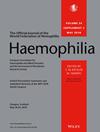A novel gene editing lexicon strategy for the haemophilia community: Research plan for development and preliminary results
Abstract
Introduction
Despite the progress in gene editing platforms like CRISPR/Cas9 with the potential to transform the standard of care for haemophilia, the language used to explain and discuss gene editing is not aligned across the haemophilia community. Here, we present the objective and rationale for developing a clear, consistent, and globally aligned gene editing lexicon to address these communication gaps.
Methods
Effectively communicating complex gene editing concepts requires a clear and consistent vocabulary. Through collaboration with a diversity of haemophilia stakeholders, our main goal is to develop an accurate, informative lexicon which avoids overpromising or highly technical terminology. Using an innovative process, representatives from several patient and scientific haemophilia organizations and select biotechnology companies will develop and refine language concepts to be tested with approximately seventy participants across the United States of America, United Kingdom, and Germany. Participants will include lived experience experts (LEEs) and haematologists. The process will be overseen by the Lexicon Steering Committee of global experts from leading scientific and patient organizations in the haemophilia and gene editing fields.
Results
Initial feedback provided a robust foundation and rationale for building clear, consistent language around gene editing. This lexicon development framework will allow for increased understanding across the haemophilia community, including the development of valid informed consent and shared decision-making materials.
Conclusion
Results provide important building blocks for stimuli development and highlight the need for a novel gene editing lexicon. In the next phase, language stimuli will be tested with LEEs and haematologists to better understand audience preferences and help shape the final lexicon.


 求助内容:
求助内容: 应助结果提醒方式:
应助结果提醒方式:


